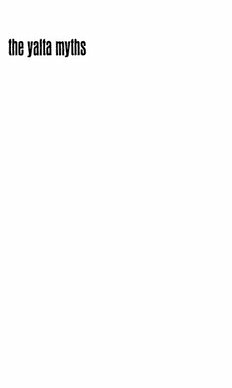
The Yalta Myths: An Issue in U.S. Politics, 1945-1955 PDF
Preview The Yalta Myths: An Issue in U.S. Politics, 1945-1955
the yalta mylhs .YALTA MYTHS an issue in u.s. politics, 1945-1955 aüii g. meoharis university ol missouri press, columbia, missouri Standard Book Number 8262-0088-5 Library of Congress Cafrd Number 70-105269 Printed and bound in the United States of America Copyright © 1970 by The Curators of the University of Missouri All rights reserved For my parents, brothers, and sisters prelace former Secretary of State Dean Acheson remarked during our July 17, 1962, interview: “Yours is not a study in history so much as a study in abnormal psychology.” The mere listing of the principal sources for this study— the Chicago Tribune, The Saturday Evening Post, George Sokolsky, Westbrook Pegler, Fulton Lewis, Jr., David Law rence, Joseph McCarthy, William Jenner, George Malone, Kenneth Wherry, Everett Dirksen, Patrick McCarran, William Langer, Rich ard Nixon, Karl Mundt, Styles Bridges, William Knowland, Lawrence Smith, Charles Kersten, Alvin O’Konski, Walter Judd, Paul Shafer, Clare Hoffman, Charles Vursell, Howard Buffett, J. Parnell Thomas, John Rankin, Clare Boothe Luce — tends to support that conclusion. I have found the postwar decade, 1945-1955, an exciting and critical one: exciting and critical because of the radical change in the popular concept of foreign and domestic policy, which showed the public’s underlying frustration and intolerance; exciting and critical because of the lost opportunities for peace and domestic reform that were squandered and emasculated during the Cold War. An understanding of the period requires a review of both domes tic and foreign policy and the realization that they affect each other. The Cold War did not merely influence U.S. foreign policy; it also created a climate that influenced domestic legislation and politics. McCarthyism was not an aberration. It dramatized the acceptance of an anti-Communist rhetoric basic to the Cold War and the shift in focus and tactics of those partisan or conservative Republicans bit terly opposed to the New Deal. Foreign policy gave those Republi cans an opportunity to discredit the progressive ideas of the New Deal and a challenge to assail the extended, complex international responsibilities basic to the Truman Administration’s containment policy. The responses of those Republicans were negativist, couched in the rhetoric of “victory over communism.” I could never have completed this study without the assistance of numerous friends, associates, and public figures. I gratefully ac knowledge the co-operation provided by the many congressmen, senators, and government officials whom I interviewed. Their direct personal involvement afforded otherwise unobtainable insights. I am indebted to John Tagliafero, Dean Kohlhoff, Nikki Feinstein, Richard Kirkendall, Mel Small, and Liza Houston Davey for their literary viii Preface criticisms and insightful comments. I also express my thanks for the assistance of Bruce Merkle, Research Director of the Republican National Committee; Philip Lagerquist, Archivist at the Truman Library; Philip Brooks, Director of the Truman Library; Erwin Mueller, Research Assistant at the Truman Library; and Joseph Wiewura, Public Relations Director of the Polish-American Con gress. A grant from the Truman Library Institute for National and International Affairs afforded the opportunity for research and com pletion of the study. A Wayne State University grant covered the typ ing costs. I express my appreciation for photoduplication assistance to Frank G. Artinian, President of the L. G. Haig Shoe Company. I am most indebted to Professor Walter Johnson, formerly on the faculty of the University of Chicago. His knowledge of the period, his tireless patience, and his interest in the topic were stimulating and invaluable. In addition to serving as an expert critic, he made recommendations on organization and style that finally brought this study into a polished state. I express my gratitude to Lois Johnson, who suffered through my deletions, inked-in corrections, and hand writing while typing the manuscript. Last, I acknowledge the fore- bearance and confidence of an understanding wife, Nancy, and the financial support and moral encouragement of my parents, brothers, and sisters. I alone am responsible for the interpretation of the Cold War and the Truman Administration’s foreign policy. A. G. T. Marquette University September, 1969 contents Preface vii Introduction 1 1. The Conference and the Myths 10 2. 1945: Co-operation and Compromise 23 3. 1946-1948: The Emergence of Partisan Politics, Part One 39 4. 1946-1948: The Emergence of Partisan Politics, Part Two 56 5. 1949: Subversion and Treason 70 6. 1950: The Repudiation of Bipartisanship 87 7. 1951: Disavowal of Past Commitments 105 8. 1952: Yalta and the Campaign 130 9. 1953-1954: Renunciation of the Campaign, Part One 154 10. 1953-1954: Renunciation of the Campaign, Part Two 180 11. 1955: The Waning of Yalta 195 Conclusion 218 Bibliography 245 Index 256 appendixes A. House Concurrent Resolution 31 225 B. Memorandum of Secretary of State Stettinius to Secretary 225 of War Stimson of May 12, 1945 C. Selected Written Questions on the Greek 226 and Turkish Aid Bill D. 1948 Republican Foreign Policy Plank 227 E. House Joint Resolutions 444, 74, 36, 111, 63 227 F. House Concurrent Resolutions 102, 13, 56 228 G. House Concurrent Resolution 108 229 H. House Concurrent Resolution 120 229 I. Amendment to the Mutual Security Act of 1951, 230 House Resolution 5113 J. Senate Joint Resolution 67 230 K. Text of the Japanese Peace Treaty 231 Concerning the Kurile Islands and South Sakhalin L. House Concurrent Resolutions 22, 44 231 M. House Joint Resolution 162 232 N. House Concurrent Resolution 68 233 O. House Joint Resolution 200 235 P. Senate Resolution 75 235 Q. Prominent Congressional Critics of Yalta 236 R. Congressional and Presidential Vote, Polish-American Dis- 238 tricts (or Counties), 1944-1954; Cook County Vote, 1948- 1954 (Congressmen)
